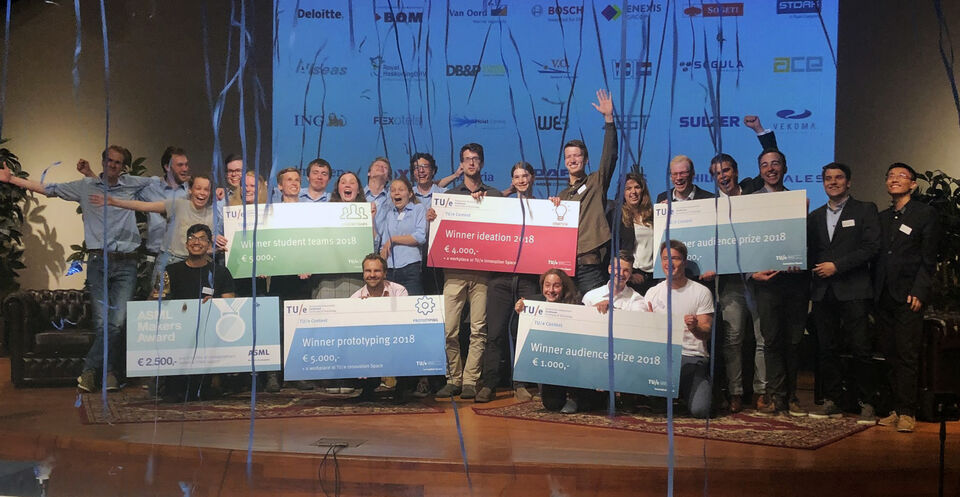In final of TU/e Contest every word must hit the mark
A biosensor for antibiotics users, software for designers and a backpack for blind people all won prizes on Tuesday evening at the TU/e Contest. Twenty participants pitched for a minute before six of them were invited by the jury to explain their entry. The best idea was produced by aWeare, the best prototype was offered by Ratio and the most promising student team, according to the jury, is Team T.E.S.T.
“A minute is hardly anything,” says Anouk van der Lee (student of Industrial Design) of Team Solid beforehand. She has sixty seconds to talk about an energy system based on iron powder and rust. Metal Fuels is its name or Power2 Metal. “We are researching the storage of renewable energy. The problem is that sometimes there is too much energy, and sometimes too little. At night, for example, there is no solar energy.”
Team Solid has emerged from an honors group led by TU/e professor Philip de Goeij. “You can store energy by converting iron into rust and then rust back into iron powder. This is a circular process that could take place in large installations. We could convert coal-fired power stations, whose use is prohibited after 2030, to carry out these conversions. The advantages of iron powder are its high energy density, its low price and the fact that it is easy to transport.” Within a minute Van der Lee has conveyed most of this, exactly as planned.
Read on below the video.
The fourth edition of the TU/e Contest is bigger than ever. An innovation market is being held in the Auditorium and former minister Jan Kees de Jager is giving an inspiring speech. It is up to Biomedical Engineering student Sander Keij to bring the project developed by iGEM (international Genetically Engineered Machine) to the attention of a wider audience than the customary one (read: BMT students). iGEM Eindhoven is presenting a protein that functions as an anchor for genetically manipulated bacteria. “When they stay in place while doing their work, we don't have to worry about behavior we can't control,” says Keij.
IGEM are participating in the TU/e Contest with a second aim in mind: “We want to focus on presenting and this year our team is big enough to do that.” Keij wrote the pitch himself and has practiced endlessly with team members over Skype: “Every word must hit the mark”. He notes a shift from telling very seriously what they are doing to presenting a simpler story about why this protein is needed.
Social impact
After the twenty pitches, audience members can cast their votes. The need for these ideas and their social impact are aspects that interest the jury, led by Commercial Director of the TU/e campus Bert-Jan Woertman. Six participants may now answer the jury's questions.
aWeare is selected as the winner of the Ideation category. They have designed navigation for visually impaired people that can be used in wearables, in this case a backpack. In the Prototyping category, Ratio wins with software that helps designers of complex systems - such as aircraft or MRI scanners - when hundreds of design documents have to be kept aligned.
Team T.E.S.T. makes an impression with their biosensor for antibiotics that patients can use at home and this earns them the top spot in the Student Teams category. The Braille keyboard for smartphones by Tipo wins the ASML Company Award. Sander Keij of iGEM needed to pitch only once at the TU/e Contest, but it was enough to take home the audience award.


Discussion